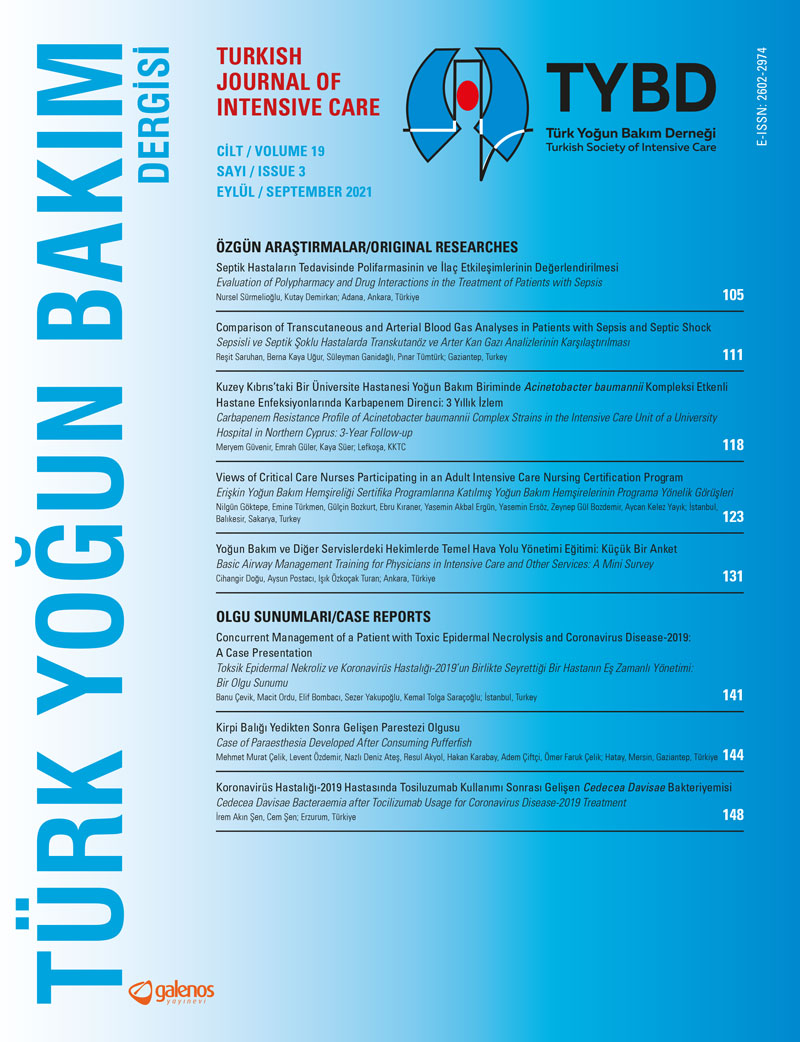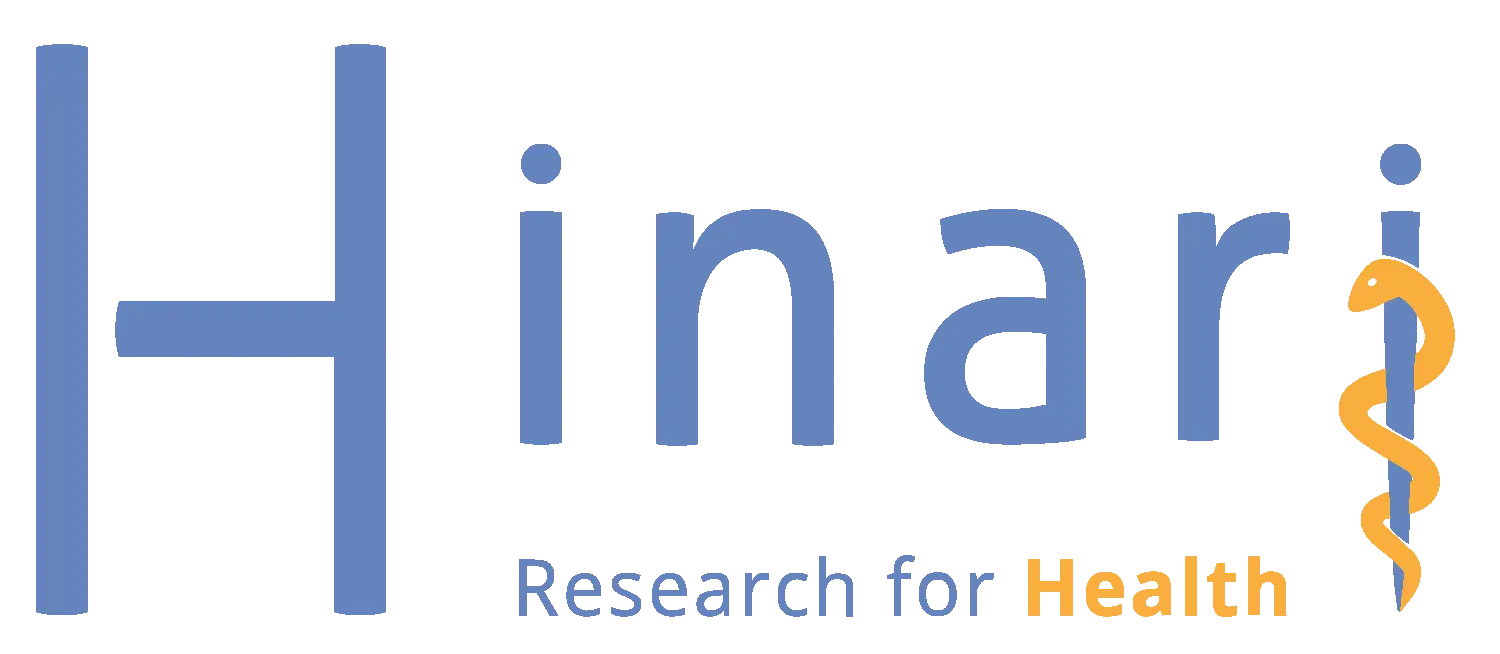Abstract
Objective:
This descriptive study aimed to reveal the views of nurses who participated in an intensive care nursing certification program regarding the process of planning and implementing care.
Materials and Methods:
The sample comprised 218 voluntary nurses who completed an intensive care nursing certificate program in one of the four education centers. A questionnaire consisting of 25 items, of which two were open-ended questions, was used to collect data. Quantitative data were evaluated with descriptive statistics, while qualitative data obtained from the open-ended questions were examined using content analysis.
Results:
The average age of the participants was 31.7±7.1 years, and 81.2% were female. The majority of the participants reported satisfaction with the program content, duration, related learning methods, practical training, and educators. Moreover, the contribution level of the program to their professional knowledge and skills was 69.2±25.2%. Two main themes were determined for the content analysis of the qualitative data, namely, the design and implementation of the program and the achievements of trainees.
Conclusion:
Nurse participants in the intensive care nursing certificate program appeared generally satisfied with the training. However, some other arrangements are needed to design a competency-based program and to have them implemented by educators who teach using common course training materials in coordination and cooperation with all training centers.
Keywords: Certificate of need, continuing education, intensive care unit, nursing
Introduction
Intensive care units (ICUs) are specialized units dedicated to caring for patients who are at high risk of life-threatening health problems and who require more vigilant nursing care. Team members from different healthcare disciplines work together in these units, where high-tech and complex treatment-care methods are intensively used, and these units are considered high-risk areas in terms of patient safety (1,2). In this context, nurses providing 24/7 services at ICUs need to receive special training and continuously renew their knowledge and skills in order to provide safe and high-quality care using current technology (3-5).
One of the important studies for content planning of critical care nursing (CCN) education is the 2004 document that included the joint declaration of the European Federation of Critical Care Nursing Associations. The Position Statement on Post-registration Critical Care Nursing Education within Europe emphasized that critical care nurses are members of a vital component of the multidisciplinary team in providing evidence-based and holistic care. In addition, it is stated that ICU patients have the right to receive care from well-trained nurses who have acquired the necessary qualifications. Specialized training is required for intensive care nurses to gain the necessary qualifications in terms of knowledge, skills, and attitudes since these qualifications are not acquired during a basic vocational education. It is noted that working with competent intensive care nurses contributes to high-quality and safe care of ICU patients and improves the institutions’ efficiency and effectiveness; however, the content of this training is insufficient to fully complete the process of continuous and lifelong learning of ICU nurses (6).
When examining how this training is conducted internationally, it is observed that the Critical Care Registered Nurse (CCRN) certificate is given at the end of a special examination or a higher education program. In the case of the United Kingdom (UK), the Adult CCRN certificate is issued in accordance with the National Standards for Adult Critical Care Nursing Education Standards, which cover three nationally defined stages. In the first stage, once nurses have obtained basic competencies (Step 1 competencies) after working at ICUs under direct supervision for at least one year, they are required to reach sixty credits for one academic year while obtaining second and third step competencies (7,8). In the United States, the CCRN certificate is issued by the American Association of Critical-Care Nurses and the Nursing Board. Nurses must work 1,750 hours at the ICU over two years, with 875 of these hours accrued in the most recent year in order to take this exam (5). Additionally, the training and orientation of nurses working in ICUs are carried out within the framework of hospital rules and regulations.
In Turkey, various education programs have been conducted by institutions since the 1990s; the very first intensive care nursing course that was approved by the Ministry of Health was held in 1990 at the American Hospital in İstanbul in cooperation with the Vehbi Koç Foundation. These programs have been carried out by the Semahat Arsel Nursing Education and Research Center since 1993, and the circular on intensive care nurse training was issued by the Ministry of Health in 2003 (9). In 2015, the Ministry of Health established standards for the framework, content, and other rules of intensive care nursing education, and these trainings were carried out in more than one hundred centers meeting these requirements (4,10,11).
Although intensive care nursing education programs contribute significantly to nursing and patient outcomes and institutional performance, they cause time constraints and economic burden to employees and the institution. Institutions are also required to make additional arrangements for these programs considering the current CCN shortage (6,12,13). In this context, the evaluation of such programs and their possible improvements (depending on the results) are essential for the effective use of resources. In addition, within the framework of continuing education standards in nursing, evaluating the contributions of programs to the professional development of nursing practice and patient care is also needed (9,14,15). This study aimed to determine the views of nurses participating in adult intensive care nursing certification programs on the design and execution of the training.
Materials and Methods
Ethics committee approval was received from the Koç University before conducting this descriptive, cross-sectional study (decision no: 2018.160.IRB3.116, date: 07.06.2018). The study was conducted between July and August 2018 at four different education centers in the Marmara Region authorized by the Ministry of Health to conduct the Intensive Care Nursing Certified Education Program. The sample comprised 427 nurses who received training between January 2015 and May 2018 at one of these four centers. All nurses were included in the sample, and the study was completed with 218 nurses who volunteered to participate. The survey response rate was 51.1%.
Researchers used a questionnaire consisting of twenty-five questions, two of which were open-ended, which they developed based on the literature (4,14). The questionnaire consisted of nine questions to reveal sociodemographic and institutional characteristics of nurses and sixteen questions to evaluate the opinions of the nurses on the certified education program. The data were collected electronically (Koç Qualtrics) after obtaining institutional permission. With the support of the administrators of the education centers, the questionnaire was sent three times, each fifteen days apart, to the nurses’ email addresses. The personal identification of the participants was not included in the data collection tool and the form was collected anonymously. Additionally, the questionnaire contained a statement noting that by submitting the questionnaire, all participants would agree to have their data included in the study.
Statistical Analysis
SPSS 24.0 was used to evaluate the data. Quantitative data were evaluated with descriptive statistics. Qualitative data obtained from the open-ended questions (448 statements from 200 participants) were examined separately by three researchers, and themes and sub-themes were determined (16).
Results
The mean age of the nurses was 31.7±7.1 years, the total period of professional experience was 10.4±7.3 years, and experience in ICUs was 5.93±4.3 years. Of the participants, 81.2% were female, 65.1% were working in public hospitals, 71.1% were working in general ICUs, and 77.5% were staff nurses (Table 1).
Of the nurses, 89.4% reported that the certificate program content was sufficient, 84.4% noted the program duration was sufficient, and 88.1% mentioned the educational methods were sufficient. In addition, 54.6% stated that they were satisfied with educators in general and 50% noted that they were satisfied with the laboratory and clinical training (Table 2). Nurses evaluated the contributions of the certification program on the scale from 0 to 100 and reported that the level of the training’s contribution to professional knowledge and skills ranged from 67.6±24.8% to 70.9±26.1% (Table 3).
The characteristics that the nurses considered effective and efficient and their recommendations for improvements to the program were categorized into two main themes (design and implementation of the program and the achievements of trainees) and six sub-themes (Table 4). In addition, 71.1% of the participants stated that the certificate examinations should continue to be conducted in the current centers while 28.9% said that they should be conducted centrally by an authorized organization.
Discussion
This study was conducted to determine the views of 218 nurses on the design and implementation of intensive care nursing certification programs.
The majority of participants reported that the content and duration of the program design were sufficient. However, when the responses to the open-ended questions were evaluated, participants stated that the content should have been more comprehensive, up-to-date, and case-based as well as more focused on improving clinical skills and competencies. Furthermore, participants wrote that there was too much repetitive information during the course and that the course duration should have been longer despite the content and duration being reported as sufficient. These certification programs are carried out within the scope of the standards set by the Ministry of Health (4). In all education centers; however, the participants’ opinions and suggestions indicate that there might be a general lack of or inadequacy in the design process in terms of needs analysis and determining the content and duration. It is necessary to conduct a needs analysis on the basis of knowledge, skills, and attitudes, to determine the desired competencies to be acquired in the program in detail, and to plan the content and duration based on this data during the design and delivery of the education programs, which are the most important issues in the standards for both continuous education in nursing (7,8,17,18).
In this study, the majority of participants stated that they were satisfied with the learning methods that were related to the design and implementation of the education program. According to the data obtained from the open-ended questions, many participants suggested improvements despite the fact that there was positive feedback on the content delivery (learning materials, methods, and environment). These suggestions included topics such as preparing and sharing the training documents in advance, enhancing the training materials, and using more interactive learning methods and simulations. As stated in the literature, education programs should be learner-centered and conducted in simulated environments with an interactive learning approach to ensure that they meet the requirements of adult education philosophy and to provide necessary qualifications (7,9,19,20). In this study, participants have different opinions regarding the learning methods and learning materials due to the lack of any common curriculum or coordination between the centers.
Participants’ satisfaction levels toward laboratory and clinical practice were found to be high. According to the data obtained from the open-ended questions, some participants reported that they were very satisfied with the training that utilized models and simulation or included practice with medical devices in ICU. However, contrary to these findings, some participants stated that practical training was not effective and efficient, and some of the participants mentioned that they felt as if they were just a labor force in their own workplace. Many participants suggested the clinical training be conducted more effectively and efficiently, its duration be extended, and its theoretical knowledge be more linked within the simulated clinical environment. In clinical training, knowledge and skills learned in the laboratory and theory classes are intensified, and competencies that the participants must acquire are tested. Clinical training in the UK program is implemented in a long-term, sustainable environment with the same nurse educator who has completed the Nurse Mentor Program for qualifying purposes (7,8). In this three-week clinical practice, within the standards of Intensive Care Nursing Certification Program of the Ministry of Health, participants must practice in different ICUs with several nurse mentors (4). In addition, the number of clinical mentors involved is another remarkable issue related to the standards. This means that one nurse mentor for each application area is considered sufficient and leads to a high number of participants per mentor. The reason that clinical training is not implemented effectively and efficiently may be associated with the short-term clinical application, the participants not practicing with the same mentor, the lack of standardization in mentoring programs, and the high number of participants per a mentor.
In this study, approximately 75% of the participants reported that they were satisfied or very satisfied with the educators. According to the data obtained from the open-ended questions, although there were participants who were satisfied with receiving training from specialist physicians and nurses, many participants stated that these particular educators’ competence on teaching the clinical skills was insufficient as well as their having apathetic and negative attitudes. The role of the educator and the program is very important for reaching the target audience and instilling professional interest and enthusiasm. Therefore, it is necessary for educators to perform a needs analysis and plan and carry out the courses with appropriate training techniques (in harmony with the objectives obtained from the analysis) in order to provide an effective course. Course managers or coordinators should facilitate coordination with educators to achieve course objectives and ensure content integrity (9,14). The Neonatal Resuscitation Program, launched in Turkey in 1996 in cooperation with the Ministry of Health and the Neonatology Association, is considered a well-structured and well-maintained program with its training material and educators (21,22). In this study, dissatisfaction with educators may be related to the lack of a common course training manual, preparatory training for educators, and the different implementations in each center.
The main objective of the critical care nursing certification program is to improve the professional knowledge and skills of nurses and to provide safer care in the clinical field. In this study, it was observed that the contribution level of education programs in terms of professional autonomy, critical thinking and decision-making, critical or emergency situation management, quality care provision, and ethical decision-making skills was lower than the expected value (avg. 69.2%). Data obtained from the open-ended questions also support this result. Participants stated that the program increased and updated their knowledge and created awareness; however, they noted that the practical training was not sufficient for qualification and clinical education and that this should be improved. In addition, assessment is also important in these programs, and approximately 30% of the participants in this study suggested assessment should be centrally organized. In fact, in such special branch nursing training, this is required to ensure that participants fully meet the desired objectives and obtain the necessary skills and to evaluate its contribution to the clinical field (7,8,23).
In this study, participants stated that the certification program provided an opportunity to create common language and strengthen social bonds through information exchange and experience sharing between colleagues. In a study by Skar (24), nurses stated that they interacted with their colleagues in constantly changing work environments and learned from each other, which is extremely useful for continuous improvement. The positive interaction between the participants of these programs is an important achievement in terms of improving critical care nursing.
Conclusion
In this study, which examined the views of 218 nurses on the design and implementation of the intensive care nursing certification program, it was found that the participants were generally satisfied with the program and that the process created an opportunity for positive interaction and experience sharing. However, it was also found that the program was not sufficient in contributing to the professional skills of the participants. The participants recommended that both the theoretical and clinical practice content of the program be improved, the duration extended, the learning materials include a common course training manual, a partnership among educators be more developed, the teaching methods be enhanced through using simulation and interactive methods, and the clinical training be improved.
Policymakers, professional organizations, and employees of education centers have a great responsibility to ensure that these programs, which are an important cost factor for both participants and institutions, be implemented within the same framework in all centers. In this context, a review of relevant standards and disciplines of execution will be effective. In addition, since this study is limited to the opinions of the participants, it is recommended that studies are conducted to include different point of views in terms of the efficiency of trainees in patient care and their contributions to the unit.
Ethics
Authorship Contributions
References
- Akalın HE. Yoğun bakım ünitelerinde hasta güvenliği. Yoğun Bakım Dergisi 2005;5:141-6.
- Türkmen E, Sevinç S, İlhan M. Intensive care units in Turkish hospitals: do they meet the minimum standards? Nurs Crit Care 2016;21:e1-10.
- Baxter R, Edvardsson D. Impact of a critical care postgraduate certificate course on nurses’ self-reported competence and confidence: A quasi-experimental study. Nurse Educ Today 2018;65:156-61.
- Sağlık Bakanlığı. Sağlık Alanı Sertifikalı Eğitim Standartları: Yoğun Bakım Hemşireliği. 2015. Erişim linki: http://www.istanbulsaglik.gov.tr/w/sb/duyurular/belge/yogun_bakim_hems_sep_standartlari_revizyon.pdf
- American Association of Critical-Care Nurses (AACN). Certification Exam Policy Handbook. 2019. Accessed URL: https://www.aacn.org/certification/preparation-tools-and-handbooks/~/media/aacn-website/certification/get-certified/handbooks
- Baktoft B, Albarran J, Drigo E, Kalafati M, Kokko A, Strunk H, et al. Position statement on post-registration critical care nursing education within Europe. European federation of Critical Care Nursing associations – EfCCNa. 2004;3-13.
- National Competency Framework for Registered in Adult Critical Care. Critical Care Networks- National Nurse Leads. https://www.cc3n.org.uk/step-competency-framework.html
- National Standards for Adult Critical Care Nurse Education, Core Curriculum and Competency Development for Registered Nurses in Adult Critical Care. 2016. Accessed URL: https://www.noeccn.org.uk/resources/Documents/Education%20Group/Standards/Nat%20Strds%20Adult%20CC%20Nurse%20Ed.pdf
- Koç Üniversitesi Hemşirelik Fakültesi Semahat Arsel Eğitim ve Araştırma Mekezi (SANERC). SANERC: Hemşireliğe Adanan 25 yıl. İstanbul: A4 OfsetMatbaacılık; 2019:67-82.
- T.C. Sağlık Bakanlığı Kamu Hastaneleri Genel Müdürlüğü Sağlık Bakım, Hasta Hizmetleri ve Eğitim Dairesi Başkanlığı Yoğun Bakım Hemşireliği Sertifikalı Eğitim Uygulama Yetkisi Alan Sağlık Tesisleri. Erişim linki: https://khgmsaglikbakimdb.saglik.gov.tr/TR,44165/6-yogun-bakim-hemsireligi-sertifikali-egitim-uygulama-yetkisi-alan-saglik-tesisleri.html
- T.C. Sağlık Hizmetleri Genel Müdürlüğü, Sağlık Bakanlığı Eğitim, Sertifikasyon ve Tescil Hizmetleri Dairesi Başkanlığı. Erişim linki: https://eshdb.saglik.gov.tr/TR,54681/duyurular.html
- Çelikel T. Yoğun bakımın organizasyonu. 2014. Erişim linki: https://docplayer.biz.tr/17610952-Yogun-bakim-organizasyonu.html
- Sevinç S, Türkmen E, İlhah M. The nursing workforce in critical care units in university and private hospitals in Turkey. Yoğun Bakım Dergisi 2014;5:5-10.
- American Nurses Credentialing Center (ANCC). 2015 ANCC Primary Accreditation Provider Application Manual. American Nurses Association 2015:1-35.
- Bozkurt G, Türkmen E. Yoğun bakım hemşireliğinde sertifika programları. Yoğun Bakım Hemşireliği Dergisi 2019;23:107-13.
- Polit DF, Beck CT. Nursing Research: Generating and Assessing Evidence for Nursing Practice, 8th ed. Wolters Kluwer Health - Lippincott Williams & Wilkins. 2012: p. 486-601.
- Dickerson PS, Graebe J. Analyzing Gaps to Design Educational Interventions. J Contin Educ Nurs 2018;49:4-6.
- Moyer A, Graebe J. Identifying the Underlying Educational Needs That Contribute to the Professional Practice Gap. J Contin Educ Nurs 2018;49:52-4.
- Lockhart JS. Creating an educational plan that meets the learning needs of nursing staff. Clin J Oncol Nurs 2006;10:257-66.
- Pilcher J, Graebe J. Strategies to Promote Learning and Engage Participants. J Contin Educ Nurs 2018;49:197-9.
- Duran R, Çiftdemir NA, Şen F, Vatansever Ü, Acunaş B. Yenidoğan “resüsitasyon” program kursu sonrası yenidoğan hemşirelerinin bilgi kazanımları. Türk Ped Arş 2007;42:153-5.
- Yenidoğan Canlandırma Programı Kapsamında Ankara’da NRP Eğitici Eğitimi Düzenlendi. 2019. Erişim linki: https://hsgm.saglik.gov.tr/tr/cocukergen-haberler/yenidogan-canlandirma-programi-kapsaminda-ankara-da-nrp-egitici-egitimi-duzenlendi.html
- Desilets LD. Connecting the dots of evaluation. J Contin Educ Nurs 2009;40:532-3.
- Skar R. How nurses experience their work as a learning environment. Vocations and Learning 2010;3:1-18.
Copyright and license
Copyright © 2021 The Author(s). This is an open access article distributed under the Creative Commons Attribution License (CC BY), which permits unrestricted use, distribution, and reproduction in any medium or format, provided the original work is properly cited.






















